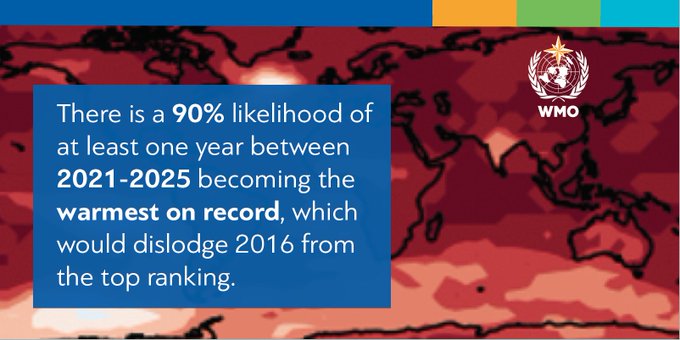According to a new climate update issued by the WMO, there is about a 40% chance of the annual average global temperature temporarily reaching 1.5°C above the pre-industrial level in at least one of the next five years.
The Global Annual to Decadal Climate Update, produced by the UK’s Met Office – the WMO lead center for such predictions – also revealed that these odds are increasing with time, and that there is a 90% likelihood of at least one year between 2021-2025 becoming the warmest on record.
Over 2021-2025, high-latitude regions and the Sahel are likely to be wetter and there is an increased chance of more tropical cyclones in the Atlantic compared with the recent past (defined as the 1981-2010 average).
The annual update harnesses the expertise of internationally acclaimed climate scientists and the best prediction systems from leading climate centers around the world.
WMO secretary-general professor Petteri Taalas said that the study is another “wake-up call” for the world to fast-track commitments to reduce greenhouse gas emissions.
“It also underlines the need for climate adaptation. Only half of the 193 WMO members have state-of-the-art early warning services,” he continued. “Countries should continue to develop the services that will be needed to support adaptation in climate-sensitive sectors and promote early warning systems that reduce the adverse impacts of extreme events.”
The update states that in the coming five years, the annual mean global temperature is likely to be at least 1°C warmer – within the range 0.9°C-1.8°C – than preindustrial levels.
The chance of temporarily reaching 1.5°C has roughly doubled compared with last year’s predictions. This is mainly due to using an improved temperature data set to estimate the baseline rather than sudden changes in climate indicators. It is very unlikely (10%) that the five year mean annual global temperature for the entire 2021-2025 period will be 1.5°C warmer than preindustrial levels, according to the climate update.
Professor Adam Scaife, the head of seasonal to decadal prediction at the Met Office, said, “Assessing the increase in global temperature in the context of climate change refers to the long-term global average temperature, not to the averages for individual years or months. Nevertheless, a temporary exceedance of the 1.5°C level may already be seen in the next few years.”



